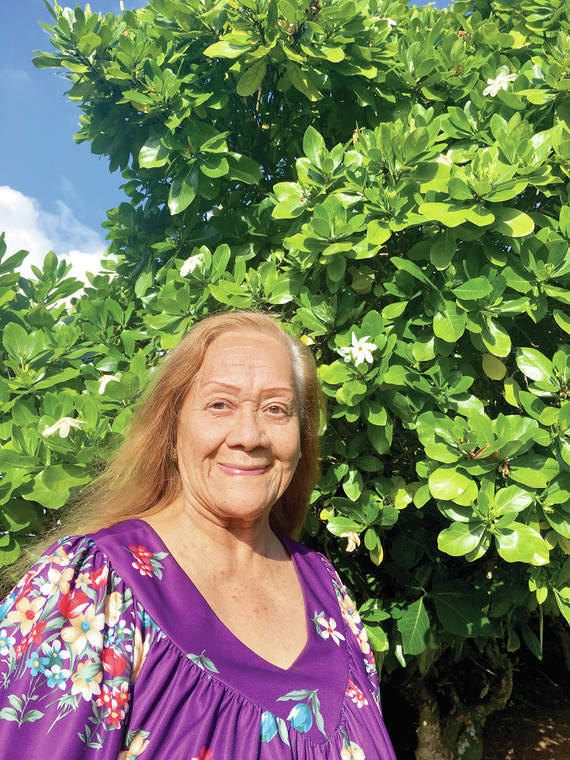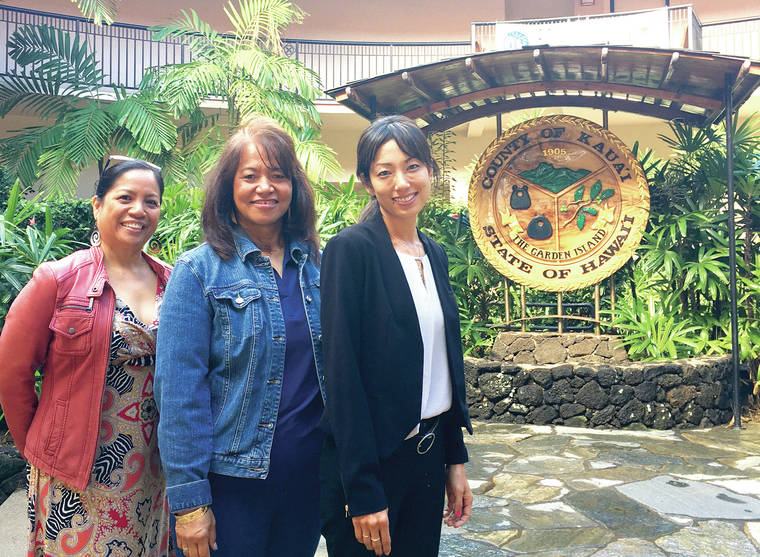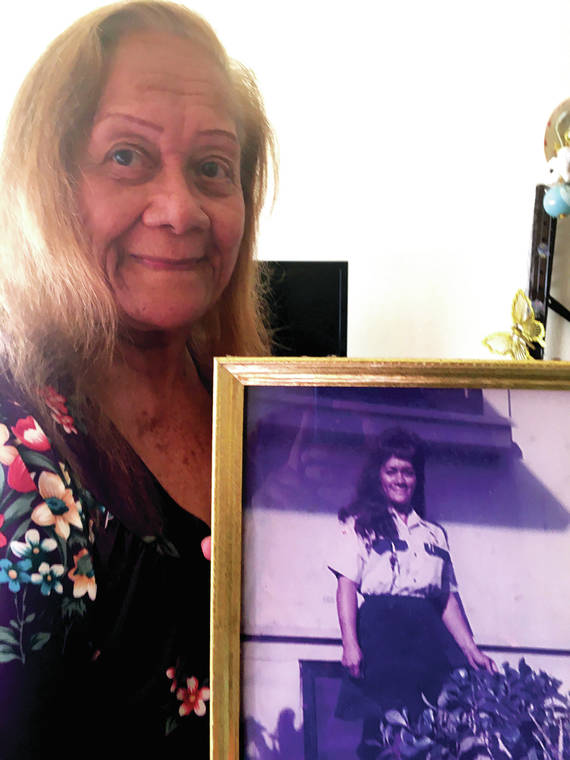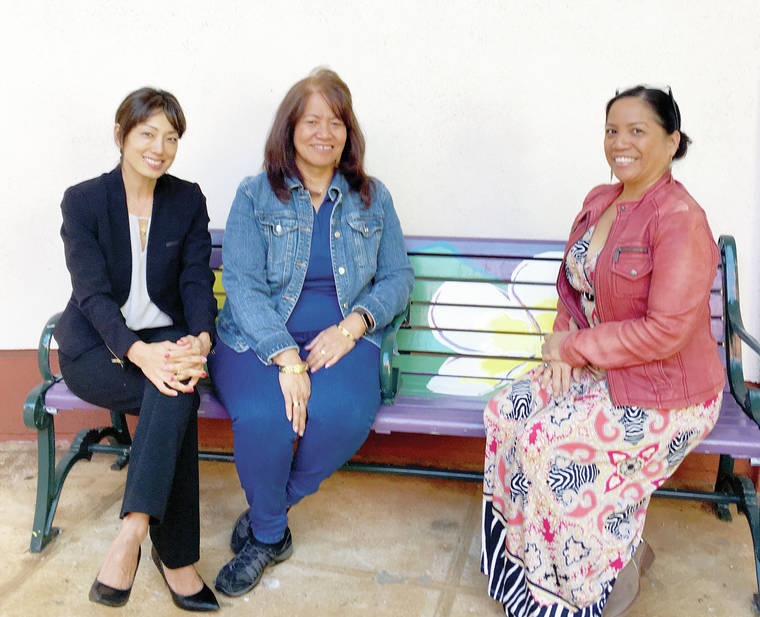Lily Jaggers is an 84-year-old kupuna who has been living at Lihu‘e Gardens Elderly apartments for more than 20 years, thanks to the help of a local food bank and services from county agencies.
A divorced mom of six, Jaggers dedicated most of her adult years to single-handedly raising a family, working as a security officer at Kamehameha Shopping Center, also known as “Kams Shop,” on the island of O‘ahu. And while she worked to make ends meet, Jaggers put just as much effort into serving her community as she did into serving her own family, always taking the opportunity to do things like helping people transport shopping bags to their vehicles.
“I helped all the elderly people carry their bags to their cars,” Jaggers said, remembering the days when she was a 38-year-old working at the shopping center. “They wanted to give me money. I wouldn’t accept it, and so they threw the money at me from their car.”
She’d use that money first to buy snacks for kids in need around the community, then to buy herself lunch.
Often, she says, police officers who were out on patrol would stop by the center for some friendly conversation — the topic of which was usually questioning what a beautiful woman like Jaggers was doing patrolling a place like Kams Shop.
“When the police officers asked me how I could work in such a place, I told them: ‘when you have children, you gotta work,’” said Jaggers.“I was still young and strong and I didn’t take alimony after my divorce.”
After retiring from security work at Kams Shop, Jaggers moved to Kaua‘i.
She says now she stays fed thanks to monthly boxes of food from the Senior Box Program at the Hawai‘i Food Bank Kaua‘i branch, and she’s not the only one at Lihu‘e Gardens on a fixed income that takes advantage of the program.
“A lot of elderly people here really depend on Hawai‘i Food bank, because their income are very small,” Jaggers said. “They have bills to pay, like rent. Of course we have HUD but that’s beside the point. I am 100%, and more, grateful for God for giving me Hawai‘i Food Bank (and) for all of staff that handle the food and preparation. It’s a lot of work. I love getting the box of food; we get all kinds of food.”
A recent press release from AARP Hawai‘i says more than half of Hawai‘i’s kupuna who are living alone lack the financial resources to pay for basic needs, and 7.5% of older couples in Hawai‘i are living in poverty, the highest percentage in the nation. Nearly 27 % of older couples in the state are at risk of not being able to afford to live in Hawaii, according to the press release.
Currently there are just under 20,000 people on Kaua‘i that are aged 60 years or older, according to the County of Kaua‘i Agency on Elderly Affairs. According to the latest numbers from Oct. 1, 2018 through Sept. 30, 2019, Elderly Affairs served 4,636 people in that category through their programs, just a fraction of the number of kupuna living on-island. Elderly receiving personal care, homemaker, home delivered meals, adult day care, case management, transportation and congregate meals totaled 607 in that time period.
Those people who qualify for service through Agency on Elderly Affairs have access to a lot of different programs, all geared toward keeping seniors healthy and independent, according to the agency’s executive director Kealoha Takahashi.
One of the newest programs the agency has launched is delivering food to their kupuna is through a company called “Mom’s Meals”, which delivers refrigerated meals every 10 days to kupuna who qualify. Each delivery is meant to last until the company makes another delivery.
“We have wellness classes at our neighborhood centers, a better choices and better health program where we do chronic disease workshop and self management for diabetes,” Takahashi said. “(The diabetes program) is a six-week program, once a week, for about two hours. It helps seniors manage their illness. We teach them how to exercise, plan their meals and what they should consider like portion control.”
The Agency on Elderly Affairs employs five staff members that help with information and referrals, according to program specialist Emily Medeiros.
“They go out and do an in-home assessment, sometimes we find they have the appliances to have food delivered or they may need some personal cleaning assistance,” she said.
Anyone can refer a kupuna to the Agency on Elderly Affairs, but there are certain criteria that have to be met before a person can qualify. The agency is currently working on a resource directory that will be available online for easier understanding of what services are available on-island.
Retired and Senior Volunteer Program (RSVP) is another program geared toward keeping kupuna active, though it’s open for people aged 55 and older. Program specialist Donna Olivas-Kaohi says it’s a way to reach seniors who aren’t directly pursuing services with Agency on Elderly Affairs.
“Some of our volunteers are still working, still employed and is at the age of 55 years. Its harder to get those ages 55, because they care for others like watching their grandkids but this program encourages them to give back to their community, and keeps them active within their community,” said Olivas-Kaohi.
Wes Perreira, HFB Kaua‘i branch manager, said he sees many kupuna benefit from taking advantage of the services offered not only through the food bank, but also through all of the other programs and services available. He also said he’s noticed an underlying trend in the population — lack of planning in the earlier years of life.
“Clients of ours, I don’t know their story, but a lot of them weren’t prepared (for retirement). They only rely on social security,” Perreira said. “ (They are) the kind of folks who made a mistake back in the day, or were never taught. Now, we are taught about 401k.”
Perreira said he thinks one of the best ways to ensure kupuna have the resources to care for themselves and maintain a high quality of life after retirement is to teach people how to save for the days when they’re not going to be working full time anymore.
He’s not the only one thinking along those lines, either.
State Rep. Nadine Nakamura is introducing a new bill to help the find ways for young adults to save — HB2251 — known as the “Hawai‘i Saves” bill.
“Many states have a system whereby new employees who work for businesses without a retirement plan are automatically enrolled in a state-sponsored retirement program. Employees can also opt out,” Nakamura said. “My bill, if funded, would study what other states have done, learn from their experiences, and set the foundation for a program in Hawai‘i. The purpose of Hawai‘i Saves is to help people save early in their careers to supplement their social security income when they retire. “
At the county level, Kaua‘i County Council member Luke Evslin pointed out the county’s Real Property Tax division “has some really helpful tax relief programs for senior citizens”, as well as the Agency on Elderly Affairs. He also says he thinks there’s room for more policy at the county level to help kupuna.
“As a policy maker, one of the areas that I think we can continually improve is to make it as easy as possible for people to build multigenerational housing. We have these dual crises in that young people can’t find homes while our kupuna are struggling to live on their own,” Evslin said.
Financial help exists on a federal level as well, explains Rodney Basconcillo, Eligibility worker at MedQuest under Department of Human Services, seniors just have to know how to apply.
“People at least 65 years old can apply for Hawai‘i Medicaid benefits here. Depending on eligibility, primarily based on their income and countable assets, senior applicants can get coverage of hospital and doctor bill co-payments —what their Medicare doesn’t cover. Automatic monthly coverage of Medicare Part B premiums, emergency dental services, flights to specialists, but not drug coverage, he said.
Seniors under 65 may qualify for similar benefits, depending on whether they are disabled with Medicare or SSI. Seniors who need nursing service for daily living can apply for an additional benefit called long-term care, which can cover most or all of the monthly cost of the nursing.
Applicants for any of the MedQuest benefits can apply at their office in the Dynasty Court building on Pahe‘e St., in Lihu‘e.
Those who work with kupuna on the island say programs are amazing, but only if people know they exist and how to get involved.
That’s where the rest of the community comes into play.
“These are our elders, and for all of us who are not in crisis, as a society, we are tasked to taking care of them,” Perreira said.








